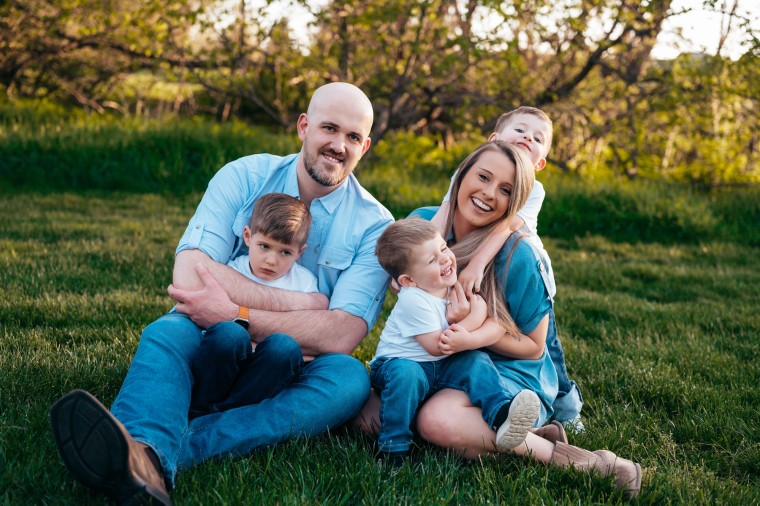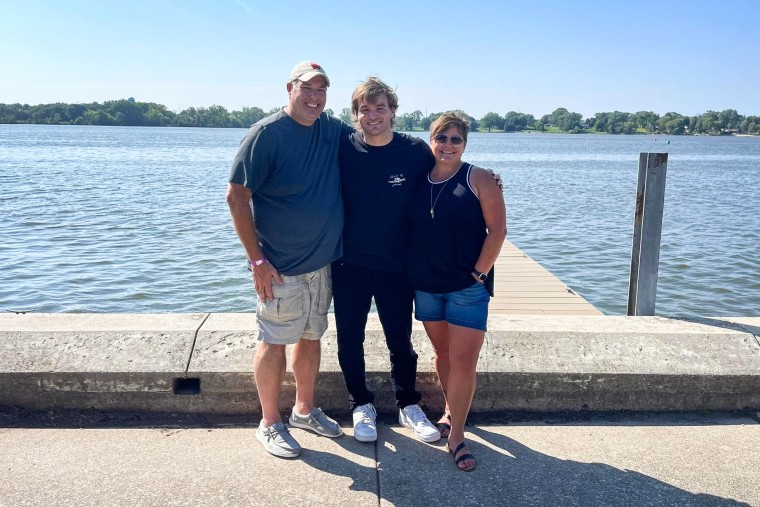Starting Saturday, the cost of inhalers will fall for many Americans, as new out-of-pocket price caps go into effect for the asthma medications from AstraZeneca and Boehringer Ingelheim.
Following years of public outcry about the high cost of inhalers, the two drugmakers — along with a third, GlaxoSmithKline — have committed to capping the out-of-pocket cost at $35 a month. GSK’s cap is expected to take effect by Jan. 1.
The moves mirror similar steps taken by insulin manufacturers last year following the passage of the Inflation Reduction Act.
Like insulin, the cost of inhalers in the U.S. is significantly higher than in other wealthy countries. An investigation by the Democratic-led Senate Committee on Health, Education, Labor and Pensions noted AstraZeneca charges $645 in the U.S. for the same inhaler it charges $49 for in the U.K. Teva Pharmaceuticals, another major inhaler manufacturer, charges $286 in the U.S. for an inhaler that costs $9 in Germany.
Caycee Shapland, 29, from Omaha, Nebraska, spends at least $80 each month on her 4-year-old son Jackson’s Symbicort, an inhaler from AstraZeneca, to manage his asthma. He also takes albuterol, also from AstraZeneca, for his asthma.
Despite having health insurance, Shapland said the cost can balloon to $350 a month — a significant financial burden — depending on the severity of Jackson’s asthma.

“Going down from at least $80 a month to $35 a month is astronomical,” Shapland said. “I mean, feeding three young boys 5 and under is $300 a week on our groceries alone. So, it’s a lot of money.”
Dr. Alan Baptist, the division chief of allergy and immunology in the department of internal medicine at Henry Ford Health in Detroit, said the price caps for inhalers should provide significant financial relief for the 30% of his patients who can’t afford their medication.
“I applaud the companies for putting that out and I was surprised by it,” Baptist said.
High prices and lack of access to inhalers, he said, play a role in the racial disparities seen in asthma care, both in Detroit and nationwide.
While asthma rates are slightly higher in Black Americans than in white Americans, “when you look at the outcomes, the adverse events, it’s so much worse,” he said. Black children were 4.5 times more likely to be hospitalized for asthma than white children, and 7.6 times more likely to die from asthma, according to the federal Office of Minority Health.
‘Chaos for patients’
More than 27 million people in the U.S. have asthma, including 5 million children, according to the Asthma and Allergy Foundation of America.
Dr. Steven Stryk, an allergist-immunologist and associate professor of internal medicine at Oakland University William Beaumont School of Medicine, said that while the price caps are a big deal, he remains skeptical until he sees how they’re implemented.
“I think what you’ll find is most doctors saying I’ll believe it when it happens,” he said.
According to a spokesperson for AstraZeneca, both privately insured and uninsured patients will be eligible for the $35 price cap, which will apply to all of the inhalers the drugmaker sells in the U.S.
A spokesperson for Boehringer Ingelheim said the $35 cap will be automatically applied at the pharmacy counter for the majority of eligible patients with commercial insurance. For those without insurance or whose pharmacies aren’t participating, they’ll be able to visit the company’s website starting Saturday, where they can enroll in a copay card that will reduce the out-of-pocket cost to $35.
GSK’s price cap will go into effect later this year, a spokesperson said, and will be available to all patients, regardless of income.
People enrolled in government insurance programs, such as Medicare and Medicaid, won’t be eligible for any of the price caps due to federal restrictions.
Out-of-pocket costs for inhalers can vary widely, depending on the medication and insurance coverage, said Dr. Megan Conroy, a pulmonologist and critical care specialist at Ohio State University’s Wexner Medical Center. “It really creates a lot of chaos for patients.”
Kiowa Rix, 27, of Warren, Michigan, found herself with a $500 out-of-pocket price tag for her son Lucas’ inhaler — Flovent, from GSK — in February, when her insurance stopped covering the medication. The 6-year-old has severe asthma and needs to use an inhaler twice a day.
Lucas’ doctor switched him to a different inhaler, from Merck, which cost $80 a month. Rix is now switching him to Symbicort, which will be capped at $35.
“It makes me feel a little better that they’re realizing they’re overcharging,” Rix said of the price caps going into effect. “You shouldn’t have to go through all these hoops just to get something lowered that you or your child needs.”
While the price caps are significant, it’s unclear whether they’ll apply to the cost of all of a patient’s asthma drugs, or $35 per inhaler.
Patients, said Conroy of Ohio State, often require a rescue inhaler for quick relief, as well as a long-acting or maintenance inhaler to prevent symptoms.
“Patients have multiple medical comorbidities that they’re treating, and a longer list of medications beyond just inhalers for their respiratory disease, some of which carry similar stories of high copays,” she said.
Devastating consequences
The price caps should at least provide a sense of relief to families that qualify, said Dr. Ixsy Abigail Ramirez, a pediatric pulmonologist at University of Michigan Health. Some families, she said, have been forced to consider skipping, delaying or going without the medication because of the high cost, which can add up to thousands of dollars a month.

“Am I going to pay for food and the roof over my head this month? Or am I going to pay for an inhaler that my child requires to breathe so that we don’t end up in the hospital incurring other costs?” she said.
Cole Schmidtknecht typically spent around $5 for his inhaler. According to his father, Bil, one day when he tried to refill his prescription, he was told it would cost more than $500, which he couldn’t afford. Cole suffered a severe asthma attack days later, leading to a fatal cardiac arrest. He was 22.
“Had he had an affordable option in front of him, he’d have probably been here today,” said Bil.
Baptist, of Henry Ford Health, said that while the price caps are a step in the right direction, they don’t go far enough.
“In some ways, it’s just a Band-Aid on the bigger problem that we have,” Baptist said. “The real problem is the outrageous cost of pharmaceutical and drug prices in the United States.”






